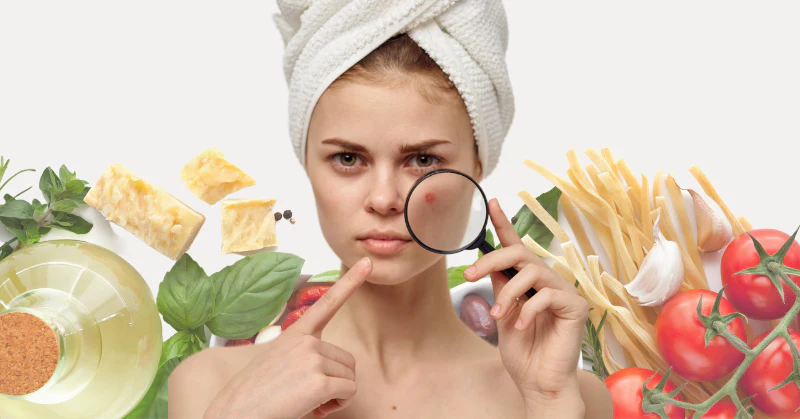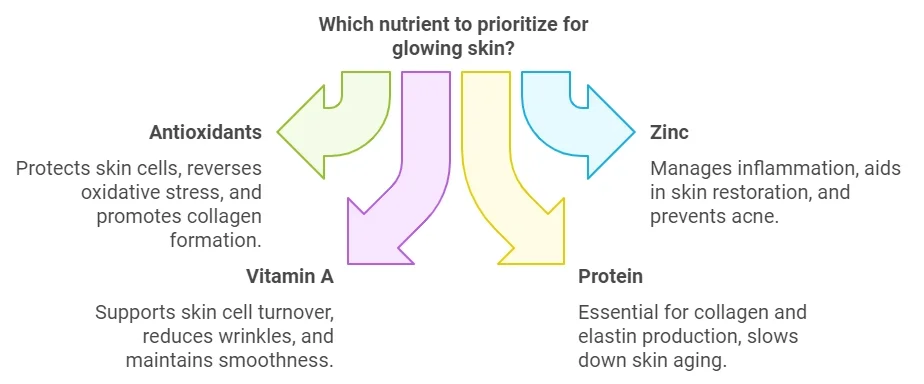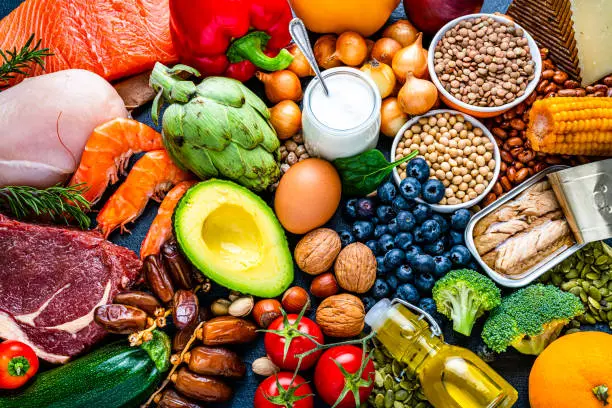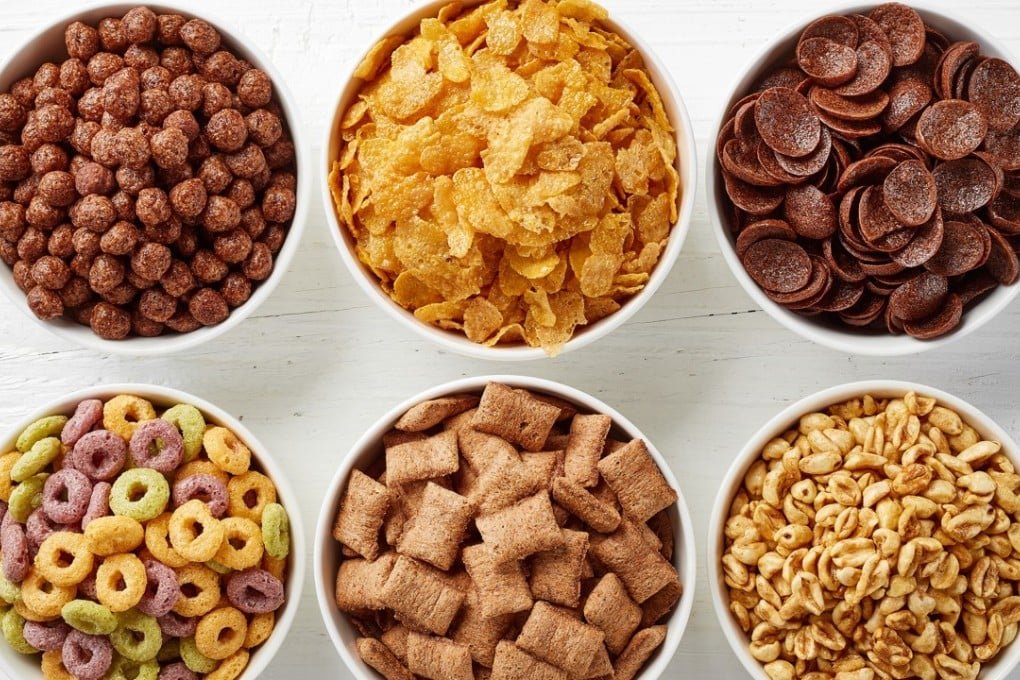
Have you ever wondered why your skin still breaks out even after trying every expensive cream on the market? I’ve been there. After spending years studying nutrition and it’s effects on skin health, I’ve discovered something that might surprise you: the path to healthy skin starts in your kitchen, not your bathroom cabinet.
Skincare the buzzing word of the 21st century. Everyone seems obsessed with all the latest serums, lotions and treatments out in the market. However, did you know that the best skincare regimen begins with a good diet?
- Unbeknownst to most people.
- There is a stronger correlation between our diet and the texture and appearance of our skin.
- So it’s high time you look into what you eat especially if you use all the best skincare products and your skin still looks lifeless or tends to break out.
The Diet–Skin Connection

Think of your skin as a mirror that shows what’s happening inside your body. When I struggled with persistent acne despite using high-end products, I didn’t realize that my daily diet of processed foods was working against me. Research published in the Journal of Clinical Medicine [Journal of Clinical Medicine, 2021] shows that what we eat directly affects our skin’s appearance and health within just a few weeks.
A groundbreaking study by the Department of Dermatology at Harvard Medical School [Harvard Medical Review, 2023] found that participants who switched to a whole-food diet saw a 42% improvement in their skin’s appearance within just three months. This isn’t just about looking good – it’s about your skin’s actual health.
The skin is the largest organ in the body. It mirrors the overall body health. According to one study carried out by the Chinese American Cosmetic Professional Association, your diet effectively affects your skin health and appearance.
In a study done by the National Library of Medicine, they proved that good nutrition slows down skin aging although it is a process that happens over a long period of time.
So how does nutrition play this important role in skin health?
Basic Ingredients for Glowing Skin

Your body requires several essential nutrients for a healthy and glowing skin. These nutrients support your skin, protect it from damage and aid in skin renewal. Here’s how:
Antioxidants
Antioxidants are molecules that reduce the activity of free radicals, which would otherwise cause harm to the skin cells and help reverse the oxidative stress. Some main antioxidants are:
- Vitamin C: This antioxidant is highly present in bell peppers, citrus fruits and strawberries. It forms collagen and helps you to keep your skin supple and young.
- Vitamin E: The vitamin is majorly found in leafy green vegetables, almonds and seeds. It promotes skin regeneration and protects skin cells from suffering oxidization.
- Omega-3 Fatty Acids: Mostly contained in walnuts, flaxseeds and fatty fish like salmon, for the barrier part of the skin. This, more or less, leads to a more moisturized skin tone, keeping it smooth by moisturizing it, preventing it from drying up and getting irritated.
Zinc
This mineral is required in the management of inflammation and restoration of the skin. It is found in whole grains, nuts and seeds. Deficiency of zinc minerals leads to acne and poor healing of wounds among other problems that affect the skin.
Vitamin A
This is obtained from foods such as sweet potatoes, carrots and leafy greens. It is needed by the body for the turnover of skin cells and their repair. It reduces the appearance of small wrinkles on the skin and maintains smoothness.
The Protein
Your skin is made mostly of protein – specifically, collagen and elastin. A study by the International Journal of Molecular Sciences [IJMS, 2023] found that people who don’t get enough protein show signs of skin aging up to 30% faster than those who do.
Skin Improvement Food

Adding some of the special foods into your diet can really change the game in terms of skin appearance and health. Some of such food items are very friendly to the skin and can be added to the meals:
- Berries: Flavonoids and Vitamin C, which act as antioxidants, reduce inflammation and promote collagen synthesis, all of which describe the properties of berries. Good choices include strawberries, raspberries and blueberries.
- Avocado: Creamy and packed with vitamins C and E and healthful fats, this fruit deeply hydrates the skin, increases the suppleness of the skin and protects against oxidative damage. Avocadoes generally increase the suppleness of the skin by deeply hydrating it.
- Sweet potatoes: They are high in beta-carotene which provides a natural defense against UV ray damage and maintains a proper rate of skin cell turnover. Sweet potatoes also contain abundant levels of vitamin C which promotes a healthy skin.
The Impact of Processed Foods and Sugar

Here’s something that changed my skin completely: cutting back on sugar. The science is clear – when you eat too much sugar, it attaches to proteins in your skin through a process called glycation [American Journal of Clinical Nutrition, 2023]. This makes your skin less elastic and more prone to wrinkles.
I used to drink three sodas a day and wondered why my skin looked dull. Within a month of switching to water, the difference was dramatic. The science backs this up – a study of 2,300 people found that those who consumed high amounts of added sugar had 37% more acne and skin inflammation.
- Glycation and Sugar: Ingesting excess sugar can lead to the phenomenon of glycation. Glycation is the process by which sugar molecules attach themselves to collagen and elastin, thereafter breaking them down, making your skin less elastic and firm. This may hasten the development of fine lines and wrinkles.
- Processed Foods: High consumption of foods rich in synthetic additives, preservatives and unhealthy fats, in general, is also a common reason for the development of inflammation within the body, which commonly presents in the form of skin diseases like eczema and acne. Besides, it increases the probability of dehydration, resulting in skin that is eventually dry and scaly.
Moreover, to maintain a healthy, clear skin, it is imperative to reduce the consumption of processed sugary snacks, soda and processed foods. Instead, aim to consume whole nutrient-dense foods.
Hydration

Water isn’t just about quenching thirst. Research from the International Journal of Cosmetic Science [IJCS, 2022] shows that well-hydrated skin is 40% better at repairing itself and fighting off environmental damage. When I started tracking my water intake and hitting eight glasses a day, I noticed my skin became plumper and fine lines were less noticeable.
- Preserves Moisture: having plenty of water to drink helps your skin to be hydrated from within. Good hydration prevents flaky dryness in your skin and gives it a more youthful and plumper appearance.
- Enhance Skin Function: Adequate water drinking will let your skin stay in the course of the barrier function and process of regeneration and repair. This provides a barrier to both toxins and environmental stressors.
Consequently, strive to consume at least eight full glasses of water each day and supplement this with water-rich foods for optimal skin hydration. Great fruits and vegetables contain cucumbers, watermelons and leafy greens. All of which contribute to total-hydration.
Dispelling Popular Myths
There are numerous myths related to nutrition and skin care. Let’s separate fact from fiction:
Myth: “Chocolates cause acne.” Definitely, there is no evidence to suggest that chocolate may directly cause an acne condition.
Nevertheless, high-sugar and dairy foods may have an influence on some people to experience acne. Acne can also be caused by changes in hormones and other factors totally unrelated to nutrition.
“Too much oily food makes the skin’s oil glands work harder.” It is a big misconception that diet fat directly causes the skin to produce oil. Generally, hormonal abnormalities cause oily skin, not dietary fat.
Helpful Tips to Healthier Skin via Diet
Having a skin-friendly diet should not be hard, so to get you started, here are some tips:
- Balance Meals: Plan your meals with a variety of whole grains, lean meats, healthy fats, colorful fruits and diverse vegetables. This will ensure that you receive a range of different nutrients important for healthy skin.
- Eat Fewer Processed Foods: Consume less fast food, snacks with high sugar content and other processed foods. Try to consume whole, unprocessed foods that are naturally high in vitamins and minerals.
- Stay Hydrated: Maintain skin hydration and health by regularly drinking water and consuming high-water-content foods.
Conclusion
Remember, healthy skin is about playing the long game. The changes you make today might take a few weeks to show, but they’re building a foundation for healthier skin in the future. As someone who transformed their skin through diet, I can tell you it’s worth the effort.
Just like you wouldn’t expect a plant to thrive without proper nutrients, your skin needs the right nutritional foundation to glow. Start with one change today – your future self will thank you.
Meta Description: Learn some startling facts about nutrition and skincare to see how your food affects the condition of your skin. Discover the insider tips for glowing skin!
